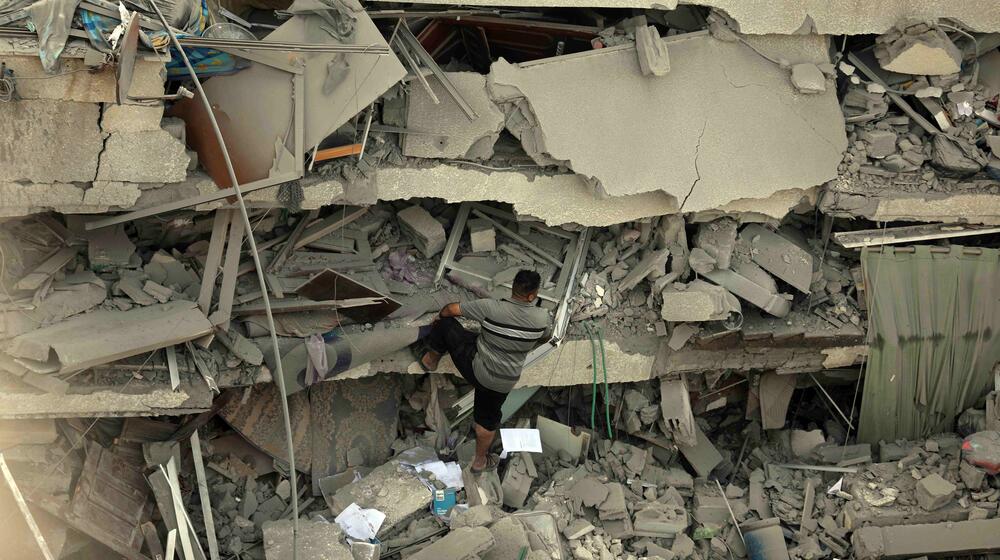News
“Race against death” amid relentless bombardment in Gaza, pregnant women tell UNFPA
- 17 October 2023
News
GAZA, Palestine – “My baby was feeling every explosion,” a pregnant woman from northern Gaza told UNFPA, the United Nations sexual and reproductive health agency, from the school where she is currently sheltering. The night before, she had slept on a cold floor that rocked with each bomb blast, she said.
Another woman described going into labour as she and her family evacuated their home amid the bombardment. "I had no idea where or how I was going to deliver my baby," she said.
She managed to reach an ambulance, which transported her to the maternity ward at Al Shifa Hospital, the largest medical facility in Gaza – but she was discharged just three hours after giving birth to a baby girl to make space for other arrivals.
“Our medical teams are overwhelmed and have been working tirelessly around the clock since the start of the escalation,” said Dr. Mohammad Abu Salmiya, the director of Al Shifa. “We're relying on a very limited fuel supply to maintain our operations. If we run out of fuel, the hospital may be repurposed as a mass burial site."
No escape
The unfolding humanitarian crisis in Gaza follows a brutal attack by Palestinian armed groups on 7 October, which killed more than 1,300 Israelis and resulted in the abduction of an estimated 199 hostages. In response, the Israeli Defense Forces (IDF) have launched a siege on the Gaza Strip, a densely populated and fully enclosed territory with no means of escape.
As of today, around 3,000 Palestinians have been killed by the IDF strikes, which have leveled entire city blocks. On 13 October, Israel called for 1.1 million Gazans to evacuate to the southern part of the territory, an area that remains under bombardment.
“For one million people to leave – many of whom have absolutely no transportation, no cars – even if they have a car, there’s no fuel in Gaza anymore – is impossible,” said Lynn Hastings, the UN Resident Coordinator and Humanitarian Coordinator for the Occupied Palestinian Territory. “Hospitals in the north have also been receiving notices that they should be evacuating. Again, another impossibility.”
“We reiterate the call by the United Nations Secretary-General to rescind the evaluation order from northern Gaza, which is making a dire humanitarian situation even worse,” said UNFPA Executive Director Dr. Natalia Kanem in a statement released yesterday. “For the thousands of women about to give birth, and those who are sick and critically injured, being forced from their homes with nowhere safe to go and no food or water, is extremely dangerous.”

“Civilians must be protected”
One 30-year-old pregnant woman told UNFPA she hid in the shadows as bombs fell. She has been overwhelmed with dizziness, fatigue and a pounding headache since fleeing her home. "Each step felt like a race against death," she said.
UNFPA estimates there are 540,000 women of reproductive age living in Gaza, among whom 50,000 are currently pregnant, and 5,500 are expected to deliver in the next month. These women face extreme challenges amid the siege, lacking not only access to safe delivery services and stocks-outs of life-saving supplies, but also, like all civilians in Gaza, refuge from bombardment and access to food and water.
UNFPA continues to support reproductive health services, and through its partner, Sharek, is distributing hygiene kits in 49 shelters in south Gaza run by the United Nations Relief and Works Agency for Palestine Refugees in the Near East. Medications for pregnant women have been delivered to the Ministry of Health. Through partner Shubak il Shabab, UNFPA is additionally supporting counselling services via an emergency helpline.
UNFPA is also prepositioning supplies, including essential medicines, medical supplies and interagency reproductive health kits, on the border in order to urgently deliver aid when access is restored. However, efforts to negotiate a humanitarian corridor have so far been unsuccessful.
“Even wars have rules,” United Nations Secretary-General Antonio Guterres said. “International humanitarian law and human rights law must be respected and upheld; civilians must be protected and never used as shields.”